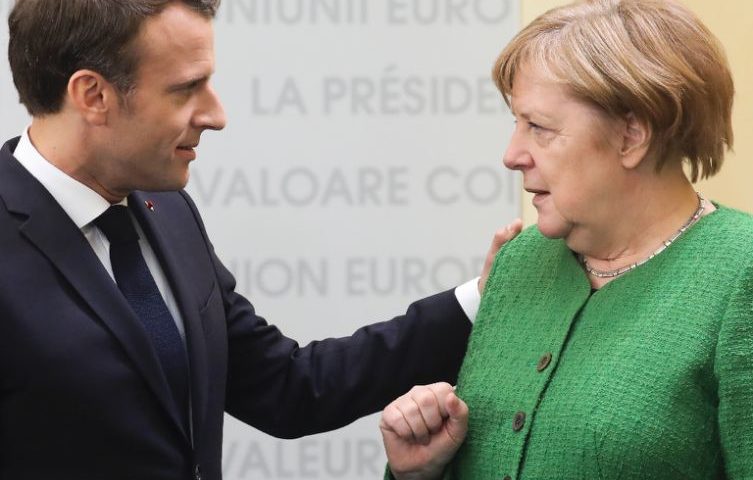
Who Man Utd have on four-man transfer wish list as Ole Gunnar Solskjaer bolsters midfield
June 18, 2019
Tory leadership hopeful Rory Stewart claims he is ‘only Brexiteer left in race’
June 19, 2019European leaders are expected to clash over Brussels’ top jobs on Thursday, as rifts between France and Germany and between the EU parliament and national capitals deepen.
Four weeks after elections to the European Parliament, 28 national leaders have been called to a summit to decide who should lead the union for the next five years.
But the mainstream parliamentary groups have yet to agree on a programme or on their candidate to replace Jean-Claude Juncker as the president of the European Commission.
Historically, cooperation between Berlin and Paris has broken many a Brussels logjam, but today President Emmanuel Macron and Chancellor Angela Merkel are at loggerheads.
At stake is not just Juncker’s job but those of president of the European Central Bank, speaker of the EU parliament, president of the European Council and head of foreign policy.
And the haggling has been made more complex by attempts to strike a better balance in the top five posts between men and women, east and west, and older and newer member states.
So will getting the 28 leaders together for talks in Brussels break the stalemate, and pave the way for parliament to start ratifying appointments when it meets on July 2?
“That is not quite easy,” Michael Roth, Germany’s minister for Europe, admitted.
“The political situation in the European Union is unclear, so it is not easy to pull off.
“We need an agreement with the European Parliament, which is very self-confident in fulfilling its role.”
Roth, a social democrat member of Merkel’s coalition, is backing the Dutch socialist and EU vice-president Frans Timmermans to inherit Juncker’s role.
But Merkel publicly supports German conservative MEP Manfred Weber, the lead candidate of the pan-European centre-right EPP bloc in the Strasbourg assembly.
Speaking in Meseberg on Monday, Merkel played down concerns the split could slow the process, suggesting it would fuel “productive tensions” at the summit.
– Bavarian ‘ectoplasm’ in trouble? –
But Macron firmly opposes Weber, who has no executive experience and little political clout, and the French leader’s party has joined the liberal Renew Europe group.
Macron’s pointwoman in Brussels, French liberal group leader Nathalie Loiseau, has dismissed the uncharismatic Bavarian as an “ectoplasm” but has failed to name another option.
The liberals have no clear candidate, with Danish EU competition commissioner Margrethe Vestager’s star fading, but Macron still believes national leaders should choose a name.
The Frenchman has ambitious plans to reform Europe and is seeking a dynamic ally in Brussels — but his fellow European centrists have personal ambitions of their own.
Renew Europe’s parliamentary leader Guy Verhofstadt dreams of ending his long career with a stint as speaker.
Belgian Prime Minister Charles Michel or the Netherlands’ Mark Rutte, meanwhile, could succeed Tusk as head of the Council, even if the Dutch liberal premier denies it.
The liberals are the third largest group after the EPP and the Socialists and Democrats (S&D) and their faction is unlikely to secure too many of the top five posts.
The fourth group in the majority coalition is the Greens, and if German co-leader Ska Keller is named speaker of parliament she would at least represent a woman in a top role.
“An agreement between France and Germany is essential to unblock the situation, but Angela Merkel is not on a sure footing at home,” a senior diplomat told AFP.
Another Brussels insider added: “If there’s no agreement on president of the Commission, there won’t be agreement at all.”
– Barnier as back-up? –
With deadlock between the main capitals, the parliament has attempted to jump into the void, reviving the long-standing institutional rivalry over control of key posts.
Weber’s best hope is if the mainstream blocs agree to back him as “spitzenkandidat” to lead a jointly-negotiated legislative programme that has not yet been agreed.
“Weber sees this as a life raft that could carry him to the Commission,” said a leading socialist negotiator who is backing Timmermans.
And if that route is barred, could there be a back-up option from outside the parliamentary system?
After all, EU Brexit negotiator Michel Barnier is an EPP member like Merkel, and a Frenchman like Macron.
No luck there, either. “If France blocks Weber, Merkel could never accept a French candidate,” warned a senior EPP figure.
And if, as expected, Thursday is a bust, then the leaders can always come back for an emergency summit on June 30.afp




